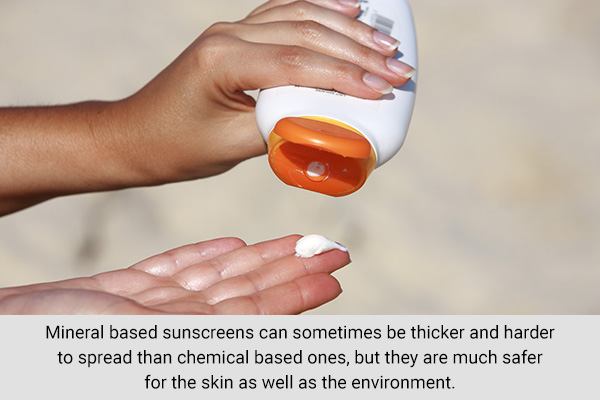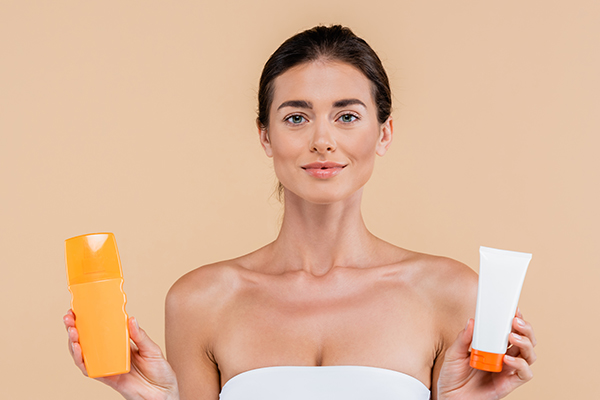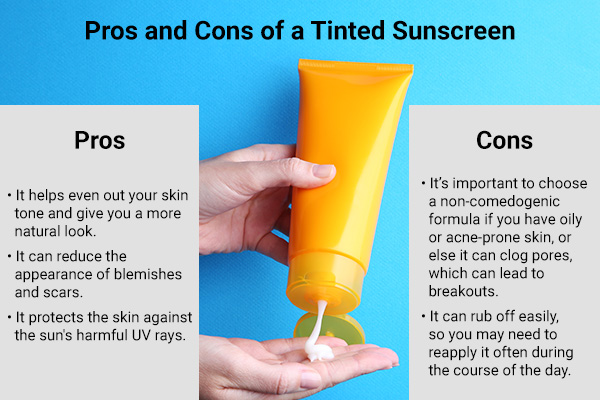In this article:
Applying tinted sunscreen is a great way to protect your skin from the harmful ultraviolet light (light invisible to the human eyes, but which is used for sterilizing medical equipment and may cause sunburns and cancers) and visible light rays without sacrificing your style.

Tinted sunscreen is the new trend in sunscreen, with many people opting for it over traditional sunscreen because it doesn’t give a white cast. (1)(2)
So, is tinted sunscreen good for oily and acne-prone skin? The answer is yes!
Tinted sunscreen can help to control shine and keep pores clear. It can be beneficial for people who have oily or acne-prone skin, as it can help to mattify the skin and reduce shine. Additionally, it can help to camouflage blemishes and give the skin a more even appearance. (3)
However, scientific evidence indicates more of the benefits of tinted sunscreen toward treating melasma and hyperpigmentation as it is better than non-tinted sunscreen in blocking visible light. Tinted sunscreen can alter the greasiness effect of oily skin due to its mattifying nature, but for acne, more scientific evidence is needed.
The problem is that not all sunscreens are made with oil-free ingredients, which can clog pores and increase the likelihood of acne development. (4)
This article will teach you how to figure out if tinted sunscreen is good for you and your skin before you make a purchase!
What Is Tinted Sunscreen?
To even out the skin tone and offer some coverage, tinted sunscreens contain pigment particles. They usually have an SPF of 15 or higher and can be used in place of foundation or BB cream. (1)(5)
Tinted sunscreens are available in several shades, which are obtained by combining iron oxides and titanium dioxide in different proportions.
The wide range of shades caters to all skin shades and, hence, is very useful for people with skin pigmentation issues caused by exposure to visible light and chronic inflammation and for people with hyperpigmentation issues such as melasma. (3)
How Does Tinted Sunscreen Benefit Oily and Acne-Prone Skin?

Tinted sunscreens can be a great option for people with oily and acne-prone skin as they are typically mineral-based or chemical based (further explored in this section). (4)
Tinted sunscreens in gel forms can help to control shine and oil production and can also provide some light coverage for blemishes. (5)(6)
As mentioned, tinted sunscreens are available in two categories: mineral-based and chemical-based.
1. Mineral-based tinted sunscreen
Mineral-based tinted sunscreens typically contain zinc oxide or titanium dioxide, sometimes even iron oxide. These compounds function by diffusing and reflecting UV rays away from the skin. (7)
Mineral-based tinted sunscreens are excellent options for those with sensitive skin because they have a low tendency to cause irritation. These sunscreens can sometimes be thicker and harder to spread, but they are generally more natural and eco-friendlier than chemical sunscreens. (8)
Mineral-based tinted sunscreens containing iron oxide also shield against visible light, as opposed to conventional sunscreens, which protect only against UV light. (2)
Mineral-based tinted sunscreens usually are in a gel form, which gives a matte finish. So, if you are concerned about your oily skin looking shiny, they are good options as they usually have a lightweight formula that is easily absorbed by your skin and give you a matte finish. (6)
Mineral-based tinted sunscreen also tends to not block pores, which is a boon for acne-prone skin. (9)
2. Chemical-based tinted sunscreen
Chemical-based tinted sunscreens typically contain avobenzone, oxybenzone, and octinoxate. Before UV rays reach the skin, these substances block them.
Chemical sunscreens can be lighter and easier to spread than mineral sunscreens, and these qualities are useful for acne-prone skin. (2)
However, they have been discontinued in several regions due to their environmental impact, as chemicals such as avobenzone and oxybenzone tend to accumulate on coral reefs, which may lead to mass-scale destruction of the reefs and organisms dependent on them such as algae and marine animals. (10)(11)
How to Choose the Perfect Tinted Sunscreen for Oily or Acne-Prone Skin?

There are a few things to keep in mind when choosing tinted sunscreen for oily skin.
First, make sure to choose a noncomedogenic formula. Second, look for a formula that contains mattifying ingredients such as clay or powder to help control shine. (3)
Finally, don’t forget to reapply! Even the best tinted sunscreen won’t do much good if you don’t reapply it throughout the day. So, make sure to keep it in your bag and touch up as needed.
What Types of Tinted Sunscreen Are Suitable for Acne-Prone Skin?
The ideal sunscreens for sensitive skin or acne-prone skin are fragrance-free, mineral-based tinted sunscreens as they are noncomedogenic (they do not clog pores) and do not accumulate on the skin’s surface. (4)
They also give a mattifying effect, which is something that people with oily skin might be looking for. (6)
How Does a Tinted Sunscreen Work?
Many people with oily and acne-prone skin shy away from products that are thick or greasy, fearing that they will clog pores and cause breakouts. However, tinted sunscreen works just like regular sunscreen, in that it contains ingredients that reflect or absorb UV rays to protect the skin from damage.
The difference is that tinted sunscreen contains pigments that help to even out the complexion and cover up imperfections. (1) This makes it ideal for people who want to avoid looking like they’re wearing a heavy layer of sunscreen on their face.
If you’re considering using tinted sunscreen, be sure to choose one that is noncomedogenic and oil-free to avoid the possibility of it clogging your pores. (9) Moreover, to ensure proper protection from the sun’s damaging rays, search for a product with an SPF of 30 or higher.
Pros and Cons of Tinted Sunscreen
There are a few pros and cons to using tinted sunscreen.
Pros:
- It can help to even out your skin tone and give you a more natural look.
- It can also be helpful in hiding blemishes or scars.
- It provides an extra protective layer against the sun’s harmful rays. (1)
Cons:
- It’s important to choose a noncomedogenic formula if you have oily or acne-prone skin, or else it can clog your pores, which can lead to breakouts.
- It can rub off easily, so you may need to reapply it often throughout the day. (2)
Pros and Cons of Tinted Sunscreen for Oily or Acne-Prone Skin
If you have oily skin, you know the feeling of your face being a grease factory. Your makeup slides off by lunchtime, and your SPF? Forget about it. It’s no wonder that you’re questioning whether tinted sunscreen is good for oily skin.
Pros:
- The main benefit of tinted sunscreen is that it can help to absorb some of the excess oil on your face. Hence, it can help your makeup stay put.
- Tinted sunscreen can help make blemishes less noticeable and even out your skin tone. (3)
- It can also help to control shine and absorb excess oil, which can be beneficial for those with oily skin. (3)
- Tinted sunscreen provides broad-spectrum protection against both UVA and UVB rays and, hence, is essential for preventing sun damage.

Cons:
- Some people find that tinted sunscreen makes their skin look oilier than it actually is.
- Tinted sunscreen may not be as effective at hiding blemishes as foundation or concealer.
- Some tinted sunscreens contain ingredients that could trigger breakouts in those with sensitive or acne-prone skin. If you have sensitive skin, you may want to do a patch test before using tinted sunscreen as it could irritate your skin. (3)
Most-Asked Questions About Tinted Sunscreen for Oily or Acne-Prone Skin
How do I know which is the right sunscreen for me?
When it comes to sunscreen, a lot of options are available on the market. There are a few things to consider that can help you pick the best tinted sunscreen for you.
First, confirm that the sunscreen has a minimum SPF of 30. Second, look for a formulation that is noncomedogenic, meaning it won’t clog your pores. Finally, pick a color that complements the tone of your skin so that it blends in seamlessly.
If you follow these guidelines, then you should be able to find a tinted sunscreen that works well for your oily or acne-prone skin.
I have acne-prone skin. Will a tinted sunscreen work well for me?
If you have oily and/or acne-prone skin, then you might want to consider using tinted sunscreen. Tinted sunscreens can help to control shine and oil production, while still protecting against the sun’s harmful rays.
Why would someone with oily skin want to use tinted sunscreen?
Tinted sunscreens are frequently used by those with oily skin to reduce shine and the visibility of pores. People with oily skin benefit greatly from the matte texture that tinted sunscreens may provide. Additionally, they may be used to conceal imperfections and balance out the skin tone.
Final Word
Ultimately, whether or not tinted sunscreen is a good option for you will depend on your skin needs and preferences. Tinted sunscreen can help to control shine and oil production, while also providing SPF protection against the sun’s harmful rays.
If you have oily or acne-prone skin, it’s important to choose a formula that is noncomedogenic and oil-free to avoid exacerbating your breakouts. You may also want to test out a small patch before using a new product for the first time.
- Was this article helpful?
- YES, THANKS!NOT REALLY


